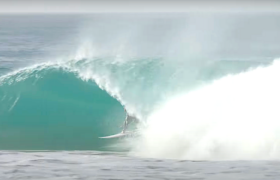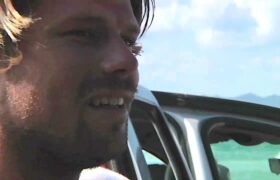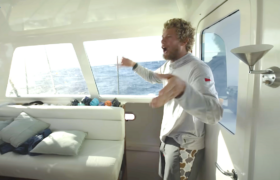The discovery of Cape St. Francis is only one of his epic stories. My first thought was, “How have I never heard of this guy?”
We surfers, we players upon the seas, are, at our worst, Instagram-loving kook heads craving attention and affirmation from other Instagram-loving kook heads in a vicious, empty void where our stomach is our god and our glory is our shame.
At our best, though, we are gallant adventurers. Original explorers of exotic, far-flung lands that we brave hell and high water to reach. Tropical disease-ridden, spoiled stomach aching, impoverished, exhausted beyond exhausted yet still driven. Caring not for fortune or fame but the simple, momentary joy of sliding down a wave for that very first time.
The Endless Summer, the 1966 Bruce Brown masterpiece which captured the very best of the surf travel life. Mike Hynson and Robert August, flying here, motoring there in search of the perfect wave until they stumbled upon it in Cape St. Francis, South Africa.
Iconic.
But did you know that an American man had surfed the break years before Brown and crew’s indelible discovery?
A man who was decidedly not an Instagram-loving kook head, caring nothing for the praise of strangers, who was content merely to experience what he had experienced?
A man named Dick Metz.
“I first heard of Dick Metz,” Richard Yelland tells me over the sound of jackhammers and taxi blasts in New York City, “from my lifeguard buddies in Laguna Beach. I worked as a lifeguard there and those watermen really do a great job of keeping the legends and the stories alive. Stories of pioneers, people who did it first. Dick’s name popped up early and was almost always included but I didn’t really know know his story until 12 Miles North.”
Yelland, a filmmaker from Laguna who directed the award-winning documentary 12 Miles North about the life of Nick Gabeldon, the first African-American surfer who made a name for himself at Malibu in those early halcyon years. His latest, Birth of The Endless Summer, follows Dick Metz, now 90, back to Cape St. Francis.
“So, I was reintroduced to Dick because he was an expert on 1950s Malibu. He was the only guy still alive who was old enough to really be there for it. I interviewed him a lot, heard his stories and began tying in what I had heard from the lifeguards and basically figured out that he had been to Cape St. Francis before Bruce Brown.
“Now, when Bruce died and so many people were writing tributes about what The Endless Summer meant to them, how it had impacted them, it made me re-realize what a powerful film it was. Surfing was pretty divided when Brown died, I mean, it still is, but The Endless Summer bonded everyone so I decided to revisit it with Dick. He told me the entire story and I understood how huge it was and now I had to make this film.”
Oh but you must watch the film to see the details, to understand how and why a young California surfer took off on a three-year surf tour, one of many, that circled the globe. How he discovered the “perfect wave” and what he did with it.
I was exceptionally curious about what Dick felt today. Bitter that Bruce Brown and cast got all the credit? The attention and affirmation? Holed up in a dark room doing squats and dips while staring at his picture vowing revenge?
“Dick never felt ripped off at all by The Endless Summer,” Yelland laughs between bites of whatever delicious New York street delicacy he had ordered. “He is so in the moment. He never had any designs on what was doing to happen. For him, he just didn’t want to go east of the Pacific Coast Highway. Didn’t want to go to a job that required lace-up shoes. I mean, those guys wrote the rules. When he and Bruce Brown talked about it, Dick would just make it a joke. Claiming is such a construct of our modern surf culture because some of us are trying to make it a living. Brown struggled immensely trying to get The Endless Summer distributed in those early days. Had to mortgage his house, play to sold out auditoriums in snow-bound Iowa in order for the studios to pay attention. It was crazy hard work. Dick Metz, on the other hand, never envisioned a career in surfing. He was just doing it because that’s what he loved.”
And what a lesson for these look-at-me look-at-me times. But is it resonating? Are kids watching Birth of The Endless Summer today? Is there anything even left to explore today?
“I know for sure there’s tons to explore and also how to explore,” Yelland raises his voice to reach above a garbage truck rumbling down the street. “If you’re going to places to blow up your Insta… that’s now what it’s about. It’s about getting lost. The world is so much smaller now, you can get anywhere, so how much do you have in terms of hunger? I’ll say this, the young people who have come to the show have loved it. There’s a connection between generations, somehow. They’ll come and watch the film then stick around for an hour to hear Metz talk then stick around for another two hours to get him to sign a poster. There’s an analog nature that is getting passed along.”
Which brings us back to Dick Metz himself. The first time I’d ever heard his name was from David Lee Scales. This discovery of Cape St. Francis is only one of the wild Dick Metz stories out there. When David Lee Scales told me about him, anyhow, my first thought was, “How in the world have I never heard of this guy?” I think this is true of everyone. Dick Metz getting passed from person to person in a classic oral tradition. Now, with Yelland’s film, the glories of adventure, of exploration, can spread like fire.
But wait, there’s more.
The singular Jamie Brisick, award-winning author, professional surfer, has written an accompanying book for the film. Birth of The Endless Summer: A Surf Odyssey is available now on Scribd and, of course, I had to speak with surfing’s greatest living author as well, though he was not in sexy New York City but rather… to be honest there were no auditory clues. Malibu, I suppose.
But Brisick’s voice, warm and charming, needs no enhancement.
“When Richard made the film he also made a deal to do a book and approached me and at our first conversation, I realized I had to write it,” he says. “I had to write it because I’ve become a much better person by traveling. So much wrong with the world today is that people aren’t exposed to other cultures.”
I asked if he had known of Dick Metz before working on the project and what took his story so long to break out.
“I had,” he tells me, “but not that much about him. Just knew vague details and why did it take so long? Maybe it’s the bouncy, sprightly nature of Metz. He’s so unique, so lighter than air and maybe as he’s gotten older it’s become easier to peg him down. Or maybe his uniqueness, today, is just more obvious. I look back on my own journey and, maybe early it seemed like it was about winning surf contests but really it was about traveling. Gathering experience. For me, when I first started, there was no email, no social media. Phone calls were expensive and maybe every two weeks you’d call home just to say, ‘Mom, I’m fine…’ then hang up. I was immersed in that travel experience. Now people travel and it’s a photo op. It breaks the dream and the spell. Dick Metz, his story, is both dream and spell.”
“Our north star.” That’s how Richard Yelland describes Dick Metz. Not just the man but how the man lived and why it matters.
Why it matters now more than ever, damned Instagram-loving kook heads.
Catch the film on 7/26 at Laemmle Santa Monica Film Center.
7/27 at Laemmle NoHo
7/29 Doris Duke Theater, Honolulu






